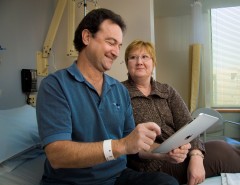On International Childhood Cancer Day, it’s important to remember that global support, research, and treatment are vital to ensuring that children in developing countries have the same chance at survival as their peers in the U.S. Physicians such as Dr. Leslie Lehmann from Dana-Farber/Boston Children’s Cancer and Blood Disorders Center travel all over the world to deliver expert, curative care to young patients with cancer. Here is her story.
Rwanda is a tiny country in central Africa with much beauty but few resources. The genocide in 1994 that killed nearly a million people also devastated the health care system. Many people do not receive basic health care services and cancer care was nonexistent. It was impossible to even tell how common cancer was – people would die from a mass, or from bleeding, or infection without ever having a diagnosis.
The country has over 11 million people with not a single physician trained in caring for people with cancer. It’s a very sad situation.
This is beginning to change a bit. Through the Partners in Health (PIH) organization, I became part of a U.S.– Rwandan team led by Sara Stulac, PIH’s director of pediatrics, assembled at the Rwinkwavu hospital with the goal of providing consistent quality care to children with cancer. Sara had lived in Rwanda working at this rural PIH-sponsored hospital for six years. I went to Rwanda with Kathleen Houlahan, a pediatric oncology nurse and nurse director of the Jimmy Fund Clinic at Dana-Farber/Boston Children’s Cancer and Blood Disorders Center, and Dr. Larry Shulman, medical oncologist and chief medical officer of Dana-Farber, who is Senior Oncology Adviser for PIH and leads Dana-Farber/Brigham and Women’s Cancer Center efforts in Rwanda.
Read more
 If you’re supporting a friend or family member who is undergoing cancer treatment, you may not think of yourself as a “caregiver.” It’s a role that can be very rewarding, but also challenging and stressful.
If you’re supporting a friend or family member who is undergoing cancer treatment, you may not think of yourself as a “caregiver.” It’s a role that can be very rewarding, but also challenging and stressful.